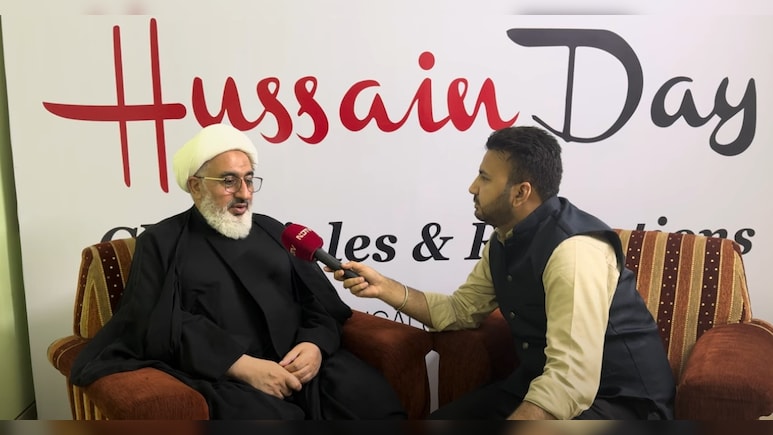
- Dr Abdul Majeed Hakeem Ilahi is one of five global representatives of Iran's Supreme Leader Ayatollah Khamenei
- Iran supports Gaza as a humanitarian duty amid sanctions and ongoing shortages of basic necessities, he said
- India, Iran share historical, cultural, and economic ties, has potential for stronger collaboration, he said
In an exclusive interview with NDTV, Dr. Abdul Majeed Hakeem Ilahi, a prominent scholar, religious leader, and representative of Iran's Supreme Leader Ayatollah Ali Khamenei, shared insights on critical global and bilateral issues. Dr. Ilahi, one of only five representatives of Ayatollah Khamenei worldwide, attended the Hussain Day event organised by Aga Sultan in Bengaluru on August 3.
What role can Iran play in the ongoing Gaza crisis?
First, I would like to thank NDTV for this prestigious platform and for hosting such a remarkable program. Attending Hussain Day in India was truly inspiring, showcasing the beautiful coexistence among followers of different religions. I congratulate the Indian people for fostering such unity, which promotes humanity and teaches us to walk in the footsteps of Imam Hussain.
Regarding the Gaza crisis, Iran's constitution mandates us to support oppressed people, whether Muslim or non-Muslim. The people of Gaza are suffering from hunger, thirst, and a lack of basic necessities. As human beings, it is our duty to help them-this is not just a religious issue but a humanitarian one. Across the world, from the US to Canada, France, and Germany, people are protesting in support of Gaza. Iran has been aiding Gaza from the outset, despite challenges posed by sanctions from some neighbouring countries and Western powers. We are doing our utmost to provide support to the oppressed.
The US has imposed a 25% tariff on India. How can India and Iran strengthen their ties in this context?
The history of India and Iran is deeply intertwined. To understand Iran's history, one must study India's, and vice versa. Over centuries, many Iranians migrated to India seeking safety and peace, as India was a hub of knowledge and culture. For instance, Indian scholars wrote 250 books addressing a single question about whether water was available to Imam Hussain on the night of Ashura, highlighting India's historical role as a center of learning.
There has always been a strong bond between Iran and India in knowledge, science, culture, and trade. Unfortunately, over time, we lost some of that closeness. However, we hope that through the efforts of both nations and their governments, we can revive those ties. Many Indian cities and places still bear Iranian names, and numerous mosques and imambaras were built by Iranian immigrants.
Currently, the economic relationship between Iran and India is good but has the potential to be much stronger, given the vast opportunities available. Politically, our ties are also positive, and we are grateful to both the Indian and Iranian governments for their efforts. With greater collaboration between our parliaments and ministries of trade, agriculture, and industry, we can further enhance these relations.
Can Iran offer any specific proposals to India, especially in light of the US tariffs?
Absolutely. The recent tensions between India and the US have opened a new chapter for India-Iran relations. Both nations are members of BRICS, which provides a platform to strengthen economic cooperation. Iran is eager to deepen its cultural and economic ties with India. Our Supreme Leader, Ayatollah Khamenei, has a deep affection for India and consistently emphasizes the need for stronger bilateral relations.
How does Ayatollah Khamenei view India?
As you know, the Supreme Leader has representatives in only five countries worldwide, and India is one of them, reflecting its significance. He loves India, its culture, and its people, and he always advocates for better cultural and economic ties. He has worked to resolve barriers in Iran-India relations and continually encourages our officials to strengthen ties with India. Whenever Iran's Foreign Minister meets him, he inquires about the state of relations with India, urging them to foster deeper economic and cultural connections.
Here in India, I feel at home. The respect, hospitality, and warmth I've experienced surpass even what I feel in Iran. This reinforces the potential for robust Iran-India relations.
There have been reports of tensions between Iran and Israel. What would Iran's strategy be if Israel attacks?
Iran is always prepared to defend itself. If anyone makes a mistake, Iran's response will be stronger than ever before. Our Supreme Leader has demonstrated courage and resolve during recent tensions.
Is it true that Ayatollah Khamenei is hiding in a bunker?
Such reports are entirely baseless and exist only in the media. The Supreme Leader never fears anything; he seeks martyrdom and stands firm in the face of challenges. He has not gone into hiding. During the recent conflict, he was actively leading and directing Iran's response to Israel.
How has your experience been in India?
In India, I don't feel like a foreigner-I feel at home. The culture, respect, and hospitality here are even better than what I experience in Iran. I am truly impressed by the Indian people and their warmth.
Track Latest News Live on NDTV.com and get news updates from India and around the world

